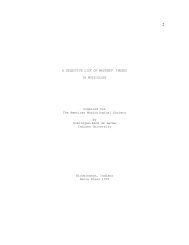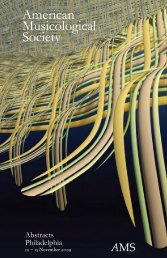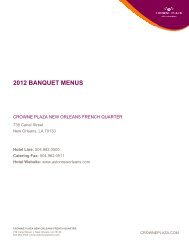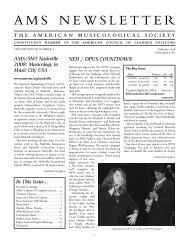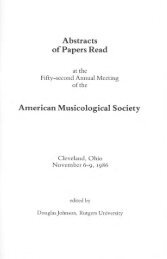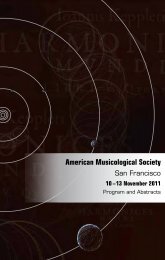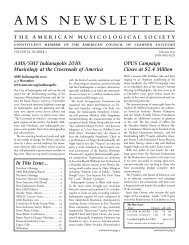Abstracts - American Musicological Society
Abstracts - American Musicological Society
Abstracts - American Musicological Society
Create successful ePaper yourself
Turn your PDF publications into a flip-book with our unique Google optimized e-Paper software.
16 Thursday Morning: Session 1- 15<br />
AMS/SEM/SMT New Orleans 2012<br />
are intentionally/unintentionally transmitted through the musical practices selected? How do the values transmitted/acquired<br />
connect with Ugandan indigenous values or western values, and are these initiatives part of a cultural revival, neo-colonial<br />
or globalization process? This paper will add to the scholarship on musical practices in Uganda by bringing an ethnomusicological<br />
perspective to bear on the interdisciplinary debate about the intervention efforts of NGOs in the country. It will also<br />
demonstrate that music is not “merely musical” by showing how it can be integral to the processes involved in the transmission/acquisition<br />
of values (Guilbault 2005:41).<br />
Administering Lusofonia through Musical Performance: Cultural Entrepreneurs in Lisbon since 2006<br />
Bart Vanspauwen (Universidade Nova de Lisboa)<br />
Since the turn of the millennium, Portugal has played an important role in promoting lusofonia and supporting organizations<br />
that sponsor Lusophone-oriented events. Especially since 2006, when the documentary Lusofonia, a (R)evolução was<br />
produced by the multinational Red Bull Music Academy, Lisbon has increasingly been the stage for Lusophone musical<br />
manifestations. Individual cultural entrepreneurs have been essential to the organization of Lusophone events and spectacles.<br />
This presentation analyzes the most significant musical examples in the last 5 years. Drawing on Guilbault’s Governing Sound<br />
(2007), I take the concept of governmentality as an useful point of departure to analyze both nation-building and transnationbuilding<br />
in the symbolic community tradition that is continuously evoked and invented by the concept of lusofonia. I want<br />
reveal how the discourse and actions of specific cultural entrepreneurs “administer” the idea of lusofonia by means of musical<br />
performance. I will especially want to clarify how cultural NGO’s mediate between governmental and commercial institutions<br />
that defend the idea of lusofonia, on the one hand, and migrant musicians from Portuguese-speaking countries with<br />
their own agendas, on the other. In other words, my focus is on the administrating agency of Lisbon-based NGOs as well as its<br />
effect on expressive culture in a transnational Lusophone space. This project contributes insights into the contemporary social<br />
realities of Portugal, and it will be significant not only to music studies but also to cultural policy studies.<br />
Democratization, Representation, and Authenticity:<br />
Conflicting Values in Publicly-funded Canadian Music<br />
Parmela Attariwala (University of Toronto)<br />
In 1988, Canada enshrined multiculturalism into law, a democratizing maneuver that allowed practitioners of non-Western<br />
artistic forms to agitate for equitable access to public arts funding. This agitation ultimately forced government-funded Canadian<br />
arts councils to re-examine their Euro-centricity and to expand the parameters by which they fund art. Today’s council<br />
music jurists—faced with a broader range of genres and a political mandate emphasizing multicultural diversity—tend to fall<br />
prey to conflicting notions of authenticity, exhibiting a parallel conflict to that existing between liberal democratic philosophy<br />
and multiculturalism’s “politics of difference” (Taylor 1992). Liberal democracy holds that each citizen be recognized as<br />
equal and have equality of opportunity in order to nurture his or her individual, authentic self. Yet, historically, Canada has<br />
treated many ethno-cultural groups unequally, resulting in the latter now pursuing politics of difference based upon collective<br />
characteristics. Collective difference politics, though, are prone to stereotype, thus making them “inhospitable to the politics<br />
of (individual) recognition” (Ibid.). Musically, this dichotomy plays out when arts council jurists make stereotype-driven assumptions<br />
about non-Western musics, expecting “authentic” ethno-cultural representation. Conversely, jurists laud Western<br />
musics for originality. Based upon many years serving as a jurist, I believe the Canadian situation has important consequences<br />
for how we teach ethnomusicology in the multicultural context: the extent to which we limit or encourage creative expressions<br />
of identity; how we acknowledge ethno-cultural borrowing; and how we nurture socio-cultural respect for all musical cultures<br />
and all musicians.<br />
Session 1-15 (SEM), 10:45–12:15<br />
Music and Political Expression<br />
Matthew Allen (Wheaton College), Chair<br />
Interpreting the Qin in Tokugawa Japan: Ogyu Sorai’s Studies on Chinese Music<br />
Yuanzheng Yang (University of Hong Kong)<br />
The presentation tackles an extremely important issue in East Asian music and Tokugawa intellectual history—the question<br />
why Japanese political thinker Ogyu Sorai (1666–1728), in the last phase of his career, composed a series of works on the Chinese<br />
qin music based on his reading of the two ancient manuscripts discovered in the early years of Kyoho (1716–1736). Written<br />
in Japanese, Ogyu Sorai’s four treatises on Chinese qin music has been looked upon as short introductory essays prepared for<br />
non-literati musicians. Nevertheless, close scrutiny reveals that Ogyu consciously applied Confucian teachings to political



